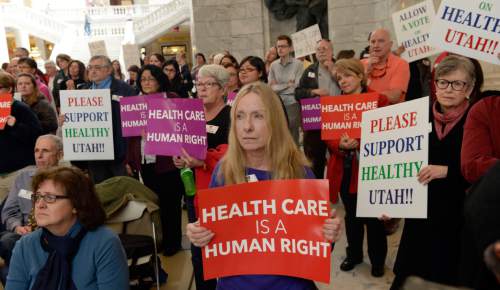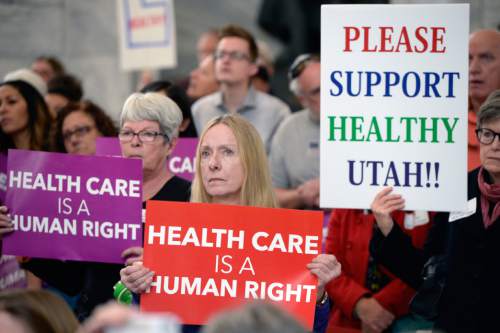This is an archived article that was published on sltrib.com in 2015, and information in the article may be outdated. It is provided only for personal research purposes and may not be reprinted.
The most contentious issue of the 2015 session — Medicaid expansion — will go unresolved in the Utah legislative session that ends at midnight.
In a Thursday news conference, Gov. Gary Herbert announced that despite being "closer than ever to finding a solution," differences between competing bills dubbed Healthy Utah and Utah Cares will not be settled.
"It's become clear to me and my colleagues that we're not going to be able to find a conclusion in this session," said Herbert.
House Speaker Greg Hughes, Senate President Wayne Niederhauser, Lt. Gov. Spencer Cox, Sen. Brian Shiozawa and Rep. Jim Dunnigan joined the governor at his press conference.
The House and Senate were expected to pass a concurrent resolution later Thursday, designating those six to reach an agreement by July 31. The resolution, Herbert said, "underscores our resolve to finish this together.
"We're here to commit to the people of Utah we're going to resolve this ... the Utah way," said Herbert, who intends to call a special session later in the summer to vote on whatever agreement he and House and Senate leaders strike.
The committee of six will consult with the Obama administration to ensure their agreement will fly, he said. Waiting until summer will allow more clarity because the Supreme Court is expected to decide King vs. Burwell in June. That case could upend the tax subsidies used by more than 140,000 Utahns this year to buy health insurance on the federal exchange.
The legislative session, with its pressure, huge number of bills and scrutiny led to "hunkering down, a bunker mentality," Herbert said. "That inhibits our ability to have discussions and find solutions."
The House at first refused to hear and then rejected Herbert's Healthy Utah plan, SB164 sponsored by Shiozawa, a Cottonwood Heights Republican. Instead, the House passed a more modest Medicaid expansion, Dunnigan's HB446, which he named Utah Cares. The Taylorsville Republican's bill was sent to the Senate Thursday afternoon, but was not expected to come up for debate.
Hughes did not assign blame for the contention over Medicaid expansion, but noted that the governor and Senate president have longer tenure.
"We're the new leadership team," he said. "This caucus is a large caucus. We're young. We have traveled far in terms of where we started this debate."
House Republicans started the session inclined to do nothing on Medicaid, Hughes said. "I'm proud the House has moved from that wait-and-see approach."
Hughes said Utah can take the lead among Republican-dominated states, many of which have so far declined to expand Medicaid.
"We have the firepower to do something," he said. "But it takes a lot of work."
Twitter: @KristenMoulton





